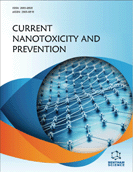Abstract
Nanoparticles applications have revolutionized different areas of the research. These include medicine, surgery, drug delivery, wastewater treatment, agriculture, cancer therapy, etc. The use of nanoparticles is increasing day by day due to their promising characteristics. With the excessive use of the nanoparticles, their accumulation in the organisms and different environments have been reported. A very high increase in the accumulation and toxicity of nanoparticles has been reported in the last decade. Therefore, the nanoparticle research has now been shifted to find new techniques and methods to minimize the toxic effects of nanoparticles. In this context, the requirement of a safe design approach and the generation of fewer toxic nanoparticles are required. One of the eco-friendly approaches for safer nanoparticles synthesis is the use of living organisms for nanoparticles production. Microbes especially, bacteria, fungi, and yeasts, are considered safe, secure, and efficient systems for nanoparticle biosynthesis. This review is an attempt to understand the potential of microbes for the biosynthesis of nanoparticles.
Keywords: Nano-factories, biosynthesized nanoparticles, microorganisms, biogenic nanoparticles, toxicity reduction, eco-friendly.
Graphical Abstract
[http://dx.doi.org/10.1016/j.apsusc.2018.11.057]
[http://dx.doi.org/10.1016/j.molstruc.2019.126938]
[http://dx.doi.org/10.1016/j.jhazmat.2019.121687] [PMID: 31784130]
[http://dx.doi.org/10.1016/j.etap.2013.09.002] [PMID: 24095717]
[http://dx.doi.org/10.1201/b19457]
[http://dx.doi.org/10.1039/c3nr00005b] [PMID: 23715524]
[http://dx.doi.org/10.1021/ja907075s] [PMID: 20038102]
[http://dx.doi.org/10.1088/0957-4484/21/2/025501] [PMID: 19955605]
[http://dx.doi.org/10.1021/bm200309x] [PMID: 21615084]
[http://dx.doi.org/10.1007/s00449-014-1251-0] [PMID: 25090979]
[http://dx.doi.org/10.1016/j.apsusc.2012.05.018]
[http://dx.doi.org/10.1039/c0gc00431f]
[http://dx.doi.org/10.1016/j.tibtech.2016.02.006] [PMID: 26944794]
[http://dx.doi.org/10.1016/j.colsurfb.2011.04.019] [PMID: 21592748]
[http://dx.doi.org/10.1016/j.colsurfb.2019.110517] [PMID: 31605948]
[http://dx.doi.org/10.1016/j.chemosphere.2019.124698] [PMID: 31493753]
[http://dx.doi.org/10.1073/pnas.1816792116] [PMID: 30760598]
[http://dx.doi.org/10.1038/am.2015.90]
[http://dx.doi.org/10.1002/9781118677629]
[http://dx.doi.org/10.1002/ceat.200900046]
[http://dx.doi.org/10.1016/j.matlet.2007.01.018]
[http://dx.doi.org/10.20546/ijcmas.2017.612.272]
[http://dx.doi.org/10.1016/j.cis.2012.12.001] [PMID: 23332127]
[http://dx.doi.org/10.1016/j.watres.2016.10.071] [PMID: 27817891]
[http://dx.doi.org/10.1166/jnn.2007.600] [PMID: 17685286]
[http://dx.doi.org/10.1021/la060873s] [PMID: 16893232]
[http://dx.doi.org/10.1016/j.envpol.2019.113514] [PMID: 31706778]
[http://dx.doi.org/10.1016/j.jenvman.2016.08.021] [PMID: 27567934]
[http://dx.doi.org/10.1016/j.biortech.2014.04.085] [PMID: 24914997]
[http://dx.doi.org/10.4014/jmb.1110.10085] [PMID: 22580320]
[http://dx.doi.org/10.1007/s10529-008-9825-z] [PMID: 18773149]
[http://dx.doi.org/10.1016/j.colsurfb.2012.03.026] [PMID: 22580481]
[http://dx.doi.org/10.3390/ma8115377] [PMID: 28793638]
[http://dx.doi.org/10.1002/btpr.651] [PMID: 21710608]
[http://dx.doi.org/10.1186/2191-0855-3-32] [PMID: 23758863]
[http://dx.doi.org/10.1007/s13205-014-0196-y]
[PMID: 25844035]
[http://dx.doi.org/10.3109/21691401.2014.937870] [PMID: 25101816]
[http://dx.doi.org/10.1016/j.colsurfa.2016.02.033]
[http://dx.doi.org/10.1016/j.nano.2016.10.009] [PMID: 27789260]
[http://dx.doi.org/10.1039/C5RA22727E]
[http://dx.doi.org/10.1016/j.procbio.2016.05.021]
[http://dx.doi.org/10.1007/s40820-016-0102-8] [PMID: 30460302]
[http://dx.doi.org/10.1166/jnn.2017.12822]
[http://dx.doi.org/10.3390/molecules22060872] [PMID: 28538674]
[http://dx.doi.org/10.1080/10934529.2017.1340754]
[http://dx.doi.org/10.1007/s00449-017-1869-9] [PMID: 29188359]
[http://dx.doi.org/10.1007/s11274-018-2514-8] [PMID: 30084085]
[http://dx.doi.org/10.1088/2043-6254/aac506]
[http://dx.doi.org/10.3390/nano8080586] [PMID: 30071582]
[http://dx.doi.org/10.1007/s13204-012-0125-5]
[http://dx.doi.org/10.1155/2017/8013850]
[http://dx.doi.org/10.1016/j.biotechadv.2007.02.001] [PMID: 17350212]
[http://dx.doi.org/10.1016/j.tibtech.2007.12.002] [PMID: 18221809]
[http://dx.doi.org/10.1016/0141-0229(86)90087-6]
[PMID: 23678420]
[http://dx.doi.org/10.1002/bit.23276] [PMID: 21809325]
[http://dx.doi.org/10.1002/smll.200600612] [PMID: 17299827]
[http://dx.doi.org/10.1039/c0jm01735c]
[http://dx.doi.org/10.1042/BA20100196] [PMID: 20923412]
[http://dx.doi.org/10.1016/j.matlet.2012.04.009]
[http://dx.doi.org/10.1016/j.colsurfb.2017.02.020] [PMID: 28242372]
[PMID: 28626689]
[http://dx.doi.org/10.1021/acs.langmuir.5b03081] [PMID: 26447769]
[http://dx.doi.org/10.1007/s11164-014-1696-4]
[http://dx.doi.org/10.1007/s10811-015-0715-1]
[http://dx.doi.org/10.1002/wnan.1363] [PMID: 26271947]
[http://dx.doi.org/10.1021/la0613124] [PMID: 17309217]
[http://dx.doi.org/10.1007/s10661-017-6033-0] [PMID: 28646435]
[http://dx.doi.org/10.15373/2249555X/JAN2014/22]
[http://dx.doi.org/10.1016/j.matlet.2013.10.107]
[http://dx.doi.org/10.1016/S1003-6326(18)64732-6]
[http://dx.doi.org/10.1016/j.cdc.2019.100190]
[http://dx.doi.org/10.1016/j.micpath.2019.103780] [PMID: 31622663]
[http://dx.doi.org/10.1016/j.micpath.2019.02.016] [PMID: 30769027]
[http://dx.doi.org/10.1016/j.carbpol.2013.03.071] [PMID: 23768580]
[http://dx.doi.org/10.1016/j.cplett.2018.08.022]
[http://dx.doi.org/10.1007/s11051-012-0831-7]
[http://dx.doi.org/10.1016/j.colsurfb.2014.05.027] [PMID: 25001188]
[http://dx.doi.org/10.1021/la1036162] [PMID: 21142094]
[http://dx.doi.org/10.1155/2017/9703614]
[http://dx.doi.org/10.1016/j.biortech.2013.05.109] [PMID: 23791020]
[http://dx.doi.org/10.1371/journal.pone.0098798] [PMID: 24932690]
[http://dx.doi.org/10.1016/j.jcis.2015.10.004] [PMID: 26454375]
[http://dx.doi.org/10.1186/s12934-016-0422-x] [PMID: 26829922]
[http://dx.doi.org/10.1128/JB.141.2.876-887.1980] [PMID: 6767692]
[http://dx.doi.org/10.1016/S0167-7799(00)01514-6] [PMID: 11146098]
[http://dx.doi.org/10.1007/s13205-013-0130-8]
[http://dx.doi.org/10.1016/j.micpath.2018.01.038] [PMID: 29407231]
[http://dx.doi.org/10.1016/S2221-1691(13)60006-4] [PMID: 23593575]
[http://dx.doi.org/10.1016/j.bcab.2019.101037]
[PMID: 25673991]
[http://dx.doi.org/10.1016/j.bcab.2016.02.012]
[http://dx.doi.org/10.1007/s12257-014-0432-7]
[http://dx.doi.org/10.1016/j.jscs.2018.02.002]
[http://dx.doi.org/10.1186/s12934-017-0826-2] [PMID: 29183326]
[http://dx.doi.org/10.1166/asl.2018.12224]
[http://dx.doi.org/10.1111/lam.12730] [PMID: 28267874]
[http://dx.doi.org/10.1016/j.matlet.2011.12.109]
[http://dx.doi.org/10.1007/s11356-013-1764-0] [PMID: 23925656]
[http://dx.doi.org/10.1007/s00449-013-0994-3] [PMID: 23771163]
[http://dx.doi.org/10.1016/j.ejar.2016.05.004]
[http://dx.doi.org/10.5897/AJB2017.16148]
[http://dx.doi.org/10.1007/s11274-017-2406-3] [PMID: 29305718]
[http://dx.doi.org/10.1007/s13205-017-0930-3]
[http://dx.doi.org/10.1007/s00775-019-01654-5] [PMID: 30915551]
[http://dx.doi.org/10.1021/acs.langmuir.6b01813] [PMID: 27466012]
[http://dx.doi.org/10.1016/j.lwt.2017.03.038]
[http://dx.doi.org/10.7324/JAPS.2018.8918]
[http://dx.doi.org/10.1007/978-3-642-24428-5_18]
[http://dx.doi.org/10.1016/j.burns.2008.06.020] [PMID: 18952381]
[http://dx.doi.org/10.1016/j.tiv.2005.06.034] [PMID: 16125895]
[http://dx.doi.org/10.1152/ajplung.00041.2008] [PMID: 18641236]
[http://dx.doi.org/10.1021/nn800596w] [PMID: 19236062]
[http://dx.doi.org/10.1016/j.toxlet.2012.07.009] [PMID: 22820426]
[http://dx.doi.org/10.1155/2014/891934]
[http://dx.doi.org/10.3109/17435390.2011.629747] [PMID: 22047016]
[http://dx.doi.org/10.1002/jps.24001] [PMID: 24824033]
[http://dx.doi.org/10.1006/jmcc.1998.0743] [PMID: 9769235]
[http://dx.doi.org/10.1021/es4043462] [PMID: 24579868]
[http://dx.doi.org/ 10.1126/science.1114397]
[http://dx.doi.org/10.1111/j.1365-2796.2009.02187.x] [PMID: 20059646]
[http://dx.doi.org/10.1080/08958370701479323] [PMID: 17687716]
[http://dx.doi.org/10.1038/s41598-018-30317-9] [PMID: 30120279]
[http://dx.doi.org/10.1016/j.scitotenv.2019.05.045] [PMID: 31085416]
[http://dx.doi.org/10.1039/C9MT00103D] [PMID: 31241124]
[http://dx.doi.org/10.1099/mic.0.036681-0]
[http://dx.doi.org/10.1002/bit.10369]
[http://dx.doi.org/10.1016/j.jece.2017.06.038]
[http://dx.doi.org/10.1049/iet-nbt.2015.0093]
[http://dx.doi.org/10.1002/smll.200500180]
[http://dx.doi.org/10.1049/iet-nbt.2012.0041]
[http://dx.doi.org/10.1186/1475-2859-12-75]
[http://dx.doi.org/10.1039/c2gc16676c]
[http://dx.doi.org/10.4014/jmb.1410.10036]
[http://dx.doi.org/10.1016/j.saa.2014.05.042]
[http://dx.doi.org/10.1016/j.elecom.2007.01.007]
[http://dx.doi.org/10.1007/s10853-008-2745-4]
[http://dx.doi.org/10.1039/c5cs00133A]
[http://dx.doi.org/10.1007/s00284-008-9160-6]
[http://dx.doi.org/10.1016/j.biortech.2009.05.051]
[http://dx.doi.org/10.1016/j.colsurfb.2010.02.007]
[http://dx.doi.org/10.1038/srep34626]
[http://dx.doi.org/10.1039/c5nr04577K]
[http://dx.doi.org/10.1088/0957-4484/19/49/495101]
[http://dx.doi.org/10.1016/j.bios.2013.11.013]
[http://dx.doi.org/10.1002/bit.20105]
[http://dx.doi.org/10.1049/iet-nbt.2016.0065]
[http://dx.doi.org/10.1016/j.enzmictec.2016.08.018]
[http://dx.doi.org/10.1007/s00253-011-3556-0]
[http://dx.doi.org/10.1016/j.procbio.2012.01.017]
[http://dx.doi.org/10.1016/j.procbio.2011.07.003]
[http://dx.doi.org/10.1186/1475-2859-8-39]
[http://dx.doi.org/10.1007/s11274-013-1379-0]
[http://dx.doi.org/10.1371/journal.pone.0059140]
[http://dx.doi.org/10.1016/j.bios.2010.06.067]
[http://dx.doi.org/10.1021/acsami.7b08003]
[http://dx.doi.org/10.1016/j.saa.2009.02.037]
[http://dx.doi.org/10.1016/j.snb.2016.06.081]
[http://dx.doi.org/10.1007/s00449-011-0646-4]
[http://dx.doi.org/10.1166/jnn.2010.2519]
[http://dx.doi.org/10.1021/ie5042325]
[http://dx.doi.org/10.1016/j.procbio.2007.02.005]
[http://dx.doi.org/10.1007/s10876-011-0412-4]
[http://dx.doi.org/10.1016/j.actbio.2011.01.023]
[http://dx.doi.org/10.1007/s11274-014-1696-y]
[http://dx.doi.org/10.1016/j.procbio.2013.02.011]
 32
32 1
1


